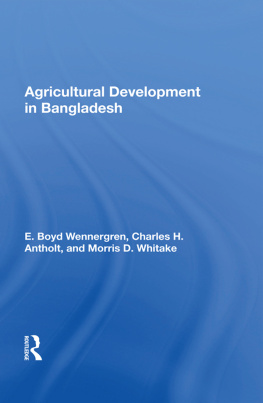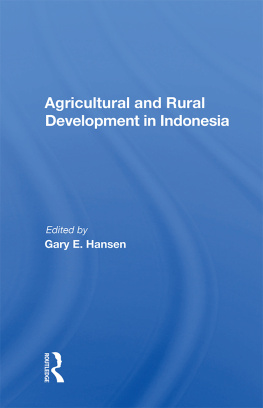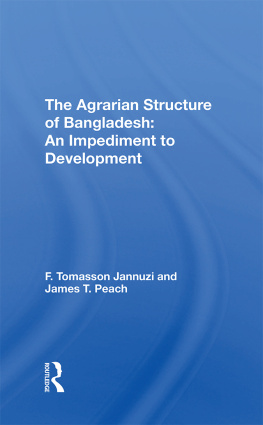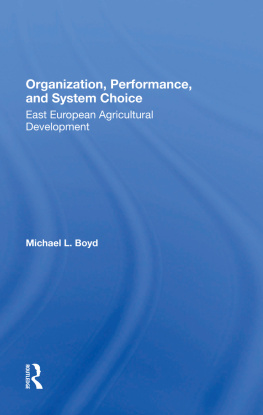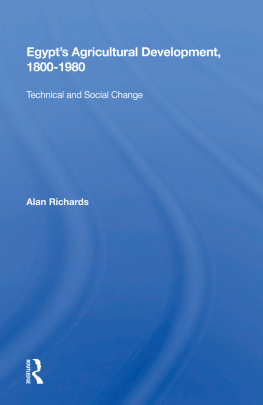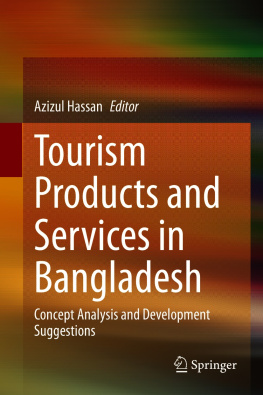Agricultural Development in Bangladesh
Westview Replica Editions
The concept of Westview Replica Editions is a response to the continuing crisis in academic and informational publishing. Library budgets for books have been severely curtailed. Ever larger portions of general library budgets are being diverted from the purchase of books and used for data banks, computers, micromedia, and other methods of information retrieval. Interlibrary loan structures further reduce the edition sizes required to satisfy the needs of the scholarly community. Economic pressures on the university presses and the few private scholarly publishing companies have severely limited the capacity of the industry to properly serve the academic and research communities. As a result, many manuscripts dealing with important subjects, often representing the highest level of scholarship, are no longer economically viable publishing projects--or, if accepted for publication, are typically subject to lead times ranging from one to three years.
Westview Replica Editions are our practical solution to the problem. We accept a manuscript in camera-ready form, typed according to our specifications, and move it immediately into the production process. As always, the selection criteria include the importance of the subject, the works contribution to scholarship, and its insight, originality of thought, and excellence of exposition. The responsibility for editing and proofreading lies with the author or sponsoring institution. We prepare chapter headings and display pages, file for copyright, and obtain Library of Congress Cataloging in Publication Data. A detailed manual contains simple instructions for preparing the final typescript, and our editorial staff is always available to answer questions.
The end result is a book printed on acid-free paper and bound in sturdy library-quality soft covers. We manufacture these books ourselves using equipment that does not require a lengthy make-ready process and that allows us to publish first editions of 300 to 600 copies and to reprint even smaller quantities as needed. Thus, we can produce Replica Editions quickly and can keep even very specialized books in print as long as there is a demand for them.
About the Book and Authors
Agricultural Development in Bangladesh
E. Boyd Wennergren, Charles H. Anrholr, and Morris D. Whitaker
The performance of the agricultural sector and other related areas of the economy of Bangladesh are assessed in this book, which includes descriptions and analyses of Bangladeshs natural and human resource bases; trends in agricultural input use and production of major crops; the agricultural marketing system; public sector interventions, organization, and financing; donor programs; and the agricultural research, extension, and educational systems. The authors identify positive factors contributing to sectoral growth and development as well as specific constraints to progress and conclude by offering an overall development strategy for achieving increased agricultural productivity, complete with specific policy and programming recommendations.
Dr. Wennergren, professor of resource economics at Utah State University, is currently an agricultural economist with the U.S. Agency for International Development in Bangladesh. Mr. Antholt is chief agricultural officer with the AID mission in Bangladesh. Dr. Whitaker, director of the Office of International Programs and Studies at Utah State University, has served as deputy agency director for food and agriculture with AID.
First published 1984 by Westview Press
Published 2018 by Routledge
52 Vanderbilt Avenue, New York, NY 10017
2 Park Square, Milton Park, Abingdon, Oxon OX14 4RN
Routledge is an imprint of the Taylor & Francis Group, an informa business
Copyright 1984 by Taylor & Francis
All rights reserved. No part of this book may be reprinted or reproduced or utilised in any form or by any electronic, mechanical, or other means, now known or hereafter invented, including photocopying and recording, or in any information storage or retrieval system, without permission in writing from the publishers.
Notice:
Product or corporate names may be trademarks or registered trademarks, and are used only for identification and explanation without intent to infringe.
Library of Congress Catalog Card Number: 83-51253
ISBN 0-86531-806-9
ISBN 13: 978-0-367-01717-0 (hbk)
This book analyzes the agricultural sector in Bangladesh since 1972, identifies the positive factors that are the bases for progress in the sector, and pinpoints the constraints that must be corrected if more rapid and equitable growth is to occur. Included within this larger framework are descriptions and analyses of the following: the contribution of agriculture to general economic growth and development; the natural and human resource base; the products of agriculture and factors of production; the marketing systems; the public sector; the programs of foreign donors; and the scientific and educational base. An overall development strategy based on increased agricultural productivity is proposed with six principal elements: increased public support for a scientific base of research, extension, and education institutions; increased investment in human capital at all levels; expanded use of modern inputs with empahsis on irrigation and associated high-yield varieties and fertilizers; modified public policies for greater market efficiency; improved employment opportunities; and an expanded export base.
Most data series used herein begin with fiscal year 1973. The analysis was limited to the postindependence period for two reasons. First, most of the important data series could not be extended backwards into the pre-Bangladesh period with an acceptable degree of accuracy. Second, independence brought a new set of institutions and policies to agriculture that differed from those of the Pakistani era. The independence period has, therefore, been characterized by a different mix of constraints than prior years, which render the data sets for the two periods incompatible. Despite this problem, we treated the earlier period for selected items to provide a better historical perspective.
Since Bangladesh is a widely studied nation, and also has a reasonably good set of publicly provided data series and statistics for agriculture and the general economy, the lack of reliable secondary data did not present the serious problem often encountered in many LDCs. Even so, several data series were either incomplete or had not been updated since the mid-1970s. The data were collected and analyzed during 1982 and 1983. Secondary data were obtained from governmental and international agencies, private institutions, donor representatives, and academic sources. The information was supplemented by a limited number of personal interviews with BDG officials (cited in endnotes).
Interpretation of the data was materially enhanced by the personal knowledge and understanding of Bangladeshi agriculture gained by the authors from assignments in Bangladesh. Dr. Wennergren has spent more than two years in Bangladesh on contract with USAID. Mr. Antholt held the position of Chief, Food and Agriculture Office of USAID from January 1980 to July 1983. Dr. Whitaker has had short-term consultancy experience in Bangladesh. The personal observations of the authors together with discussions with knowledgable Bangladeshis added to the documentation of the present status of the agricultural sector.

